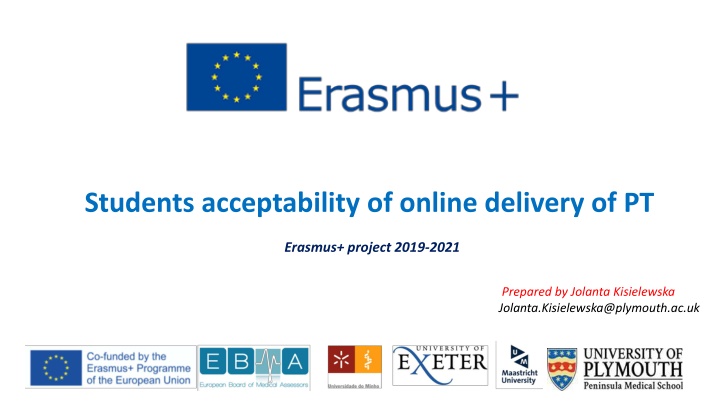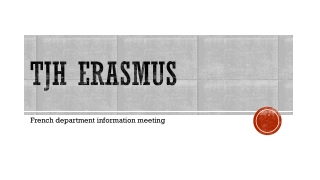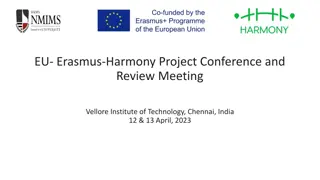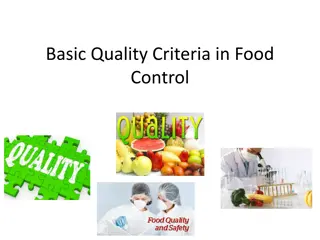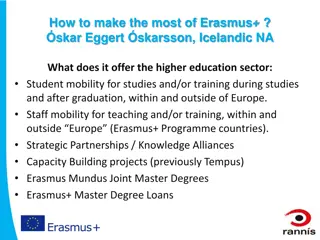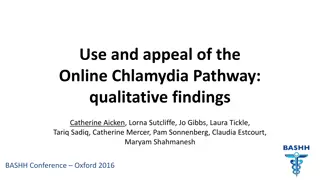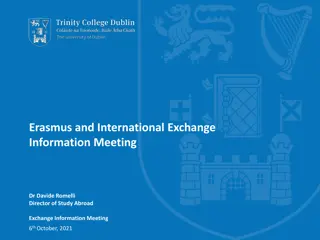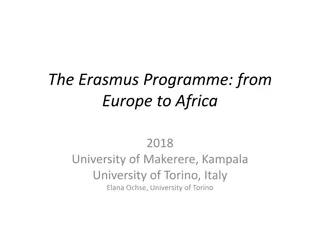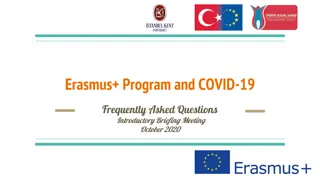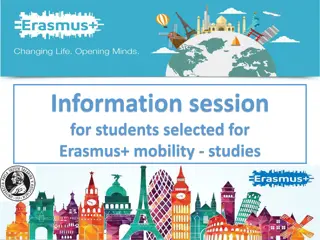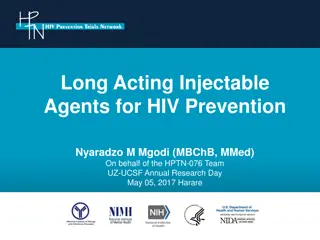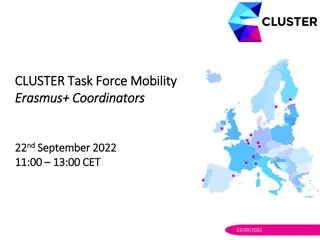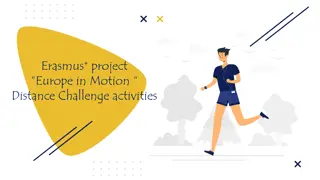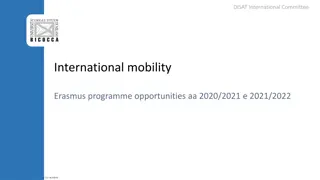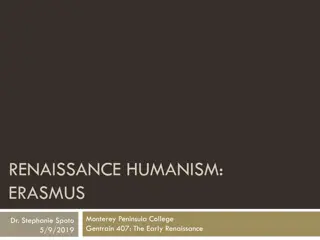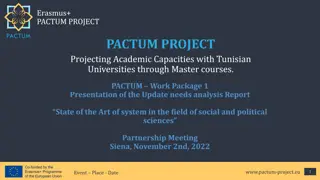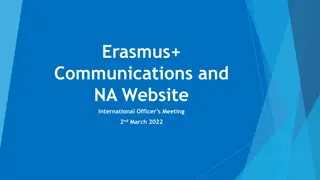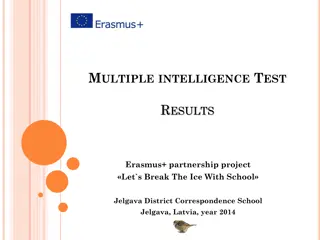Students' Acceptability of Online Delivery of PT Erasmus+ Project 2019-2021
This study examines the students' acceptance of online delivery in the PT Erasmus+ project from 2019 to 2021. It includes the structure of questionnaires, pilot tests, demographic data, and feedback responses from participants across different partner countries. The evaluation focuses on the clarity of instructions, remote delivery, and overall user experience of the online tests.
Download Presentation

Please find below an Image/Link to download the presentation.
The content on the website is provided AS IS for your information and personal use only. It may not be sold, licensed, or shared on other websites without obtaining consent from the author.If you encounter any issues during the download, it is possible that the publisher has removed the file from their server.
You are allowed to download the files provided on this website for personal or commercial use, subject to the condition that they are used lawfully. All files are the property of their respective owners.
The content on the website is provided AS IS for your information and personal use only. It may not be sold, licensed, or shared on other websites without obtaining consent from the author.
E N D
Presentation Transcript
Students acceptability of online delivery of PT Erasmus+ project 2019-2021 Prepared by Jolanta Kisielewska Jolanta.Kisielewska@plymouth.ac.uk
Three pilot tests delivered: two calibration tests and one Adaptive Progress Test Each of the pilot involved a questionnaire 1st pilot Test Life 2nd and 3rd - Quizone
Structure of questionnaires 1. Demographic data: - 1st language and English language provision - Learning disability - Stage of the medical programme - Age - Gender - Nationality - University 3. Items (1-5 the highest) - I think the questions were clearly formulated - I think the quality of the items was correct - I think the level of the test was appropriate for the stage of my study - I think the length of the test was appropriate - Time for sending comments 4. Adaptive part for the 3rd test - I think the adaptive progress test is a good measurement instrument of my knowledge - I think the adaptive progress test is a better measurement instrument of my knowledge compared to other knowledge tests I have experienced on my programme of study -I feel more motivated to study after the adaptive progress test compared with other knowledge tests I have experienced on my programme of study -In my opinion the structure of questions was clearly relate to my level of knowledge 2. Evaluation of online/remote delivery of the test 1-5 ( 5 the highest) - Instructions how to take the test online /remotely - Clarity of expectation from a student - Remote delivery of the test (2nd and 3rd test) - Help I have received during remote delivery of the exam - Practical organisation of this test - Software of this test was easy to use
Demographic all pilots Partner Country Pilot 1 Participants Pilot 2 Participants Pilot 3 participants Total Participants Feedback Responses (response rate %) Female Finland Netherlands Poland Portugal UK Total 59 46 11 156 182 85 423 47 48 41 66 83 47 80 408 481 324 1213 122 140 342 116 136 196 81 (70%) 352 (83%) 87 (64%) 121 (62%) 307 (90%) 948 (78%) 52.5% 78.10% 65.4% 66.9% 66.17% 67.8% English provision Partner Country Finland Netherlands Poland Portugal UK Competent in English * 1-2nd pilot Competent in English * 3rd pilot Fluent in English ** 1-2nd pilot Fluent in English ** 3rd pilot Senior years (Stages 3-6) 1st and 2nd pilot Senior years 3rd pilot * "Yes" to the statement: I can understand texts that consist mainly of high frequency every day or job-related language. I can understand the description of events, feelings and wishes in personal letters. ** "Yes" to the statement: I can read with ease virtually all forms of the written language, including abstract, structurally or linguistically complex texts such as manuals, specialised articles and literary works. 100% 90.1% 44.1% 45.4% 81.2% 45.4% 99.5% 100% 67.6% 59.4 69.6% 93.2% 100% 100% 85.7% 59.4% 67.3% 81.2% 97.3% 100% 64.9% 74.4% 63.4% 78.7% 100.0% 97% 85.0% 92.4% 53.6% 39%
Online/Remote delivery 2nd test 1st test 3rd test
Online /Remote delivery 2nd test 1st test 3rd test
Remote delivery 2nd and 3rd pilot Conclusions 1. Students were very satisfied with online or remote delivery of the test 2. Students were very satisfied with instructions and help they received during online/remote delivery of pilots 3. Lots of students commented on the software, both with the Likert scale and free comments: most of the students agreed that the software (both test life and quizone) were easy to use 4. Satisfaction with practical organization of the test increased with the next pilot shifting more answers from 4 to 5 in Likert scale 5. The very first remote delivery of the test impacted on the number of students who responded to the survey (2nd survey). 6. Embedding the survey in the programme during pilot 3 significantly improved response rate and data collection. 7. Overall satisfaction significantly increased from the first remote delivery, pilot 2, to the second one.
Students feedback on items 2nd test 1st test 3rd test
Students feedback on items 1st test 2nd test 3rd test
Students feedback on items Conclusions 1. Students commented on spelling mistakes within questions in test 1. Those were corrected and most of the students agreed that questions were clearly formulated. 2. Generally students were satisfied with the quality of items 63.5% in test 1 and 69% of students in test 3 agreed that the quality of questions was good (graph is not shown). 3. In two first test only about 42% of students agreed that the test was appropriate for their study (Test 1 42%, test 2 43%), however this has increased in adaptive test to 51%. This was also supported by free students comments. 4. Majority of students are used to tests being of 100-125 items therefore, there was a high level of satisfaction related to the length of the test.
Adaptive part of the Test 3 Conclusions 1. 63% of students agreed that Adaptive progress test is a good measurement of their knowledge; 24% were undecided 2. More than half of the students who responded (54%) agreed that they feel more motivated to study when tested using Adaptive Progress Test. 26% were undecided 3. Generally students were very satisfied with the level of the test appropriate to their stage - Almost 60% of students agreed that the structure of questions was well related to their knowledge and 62% agreed that questions matched the level of their knowledge. Student have also confirmed this in free comments. - 57% of responders agreed that the questions they had to answer were representative for the level of knowledge I have gained in my studies up until now
Many thanks to all of the people who worked on delivery of the ERASMUS+ project from all partners, students participants, administrators and technical support from QuizOne and TestLife.
